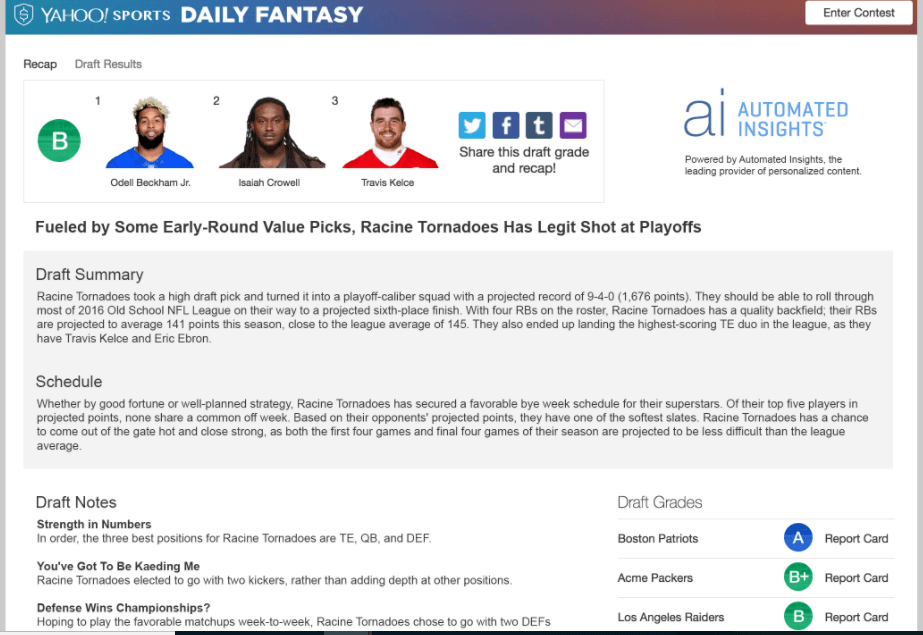
Technology Provider: Automated Insights is a provider of natural language generation platform, Wordsmith, that converts big data into narratives or summary understandable by humans
User: Yahoo!, the web services provider headquartered in Sunnyvale, CA.
Industry: Media, Entertainment
Function: Process Automation
The Problem
According to Ken Fuchs, head of Yahoo! Sports, most fantasy football users spend up to 29 hours per year on their teams.Yahoo! was looking to improve audience engagement for their fantasy football platform through the use of personalized stories, in the form of match recaps, automated draft reports and match previews.
To quote Alexander Eule of Barron’s who spoke to Ken Fuchs, “engagement, of course, is a key metric for advertisers,” and that is surely not lost on Yahoo! or its CEO”. These stories needed to be updated every week and produced for millions of users; a task which would be impossible for any human team of writers.
Actions Taken
Yahoo!, used Automated Insights’ Wordsmith platform to showcase fantasy football data in the form of personalized reports, match previews, and match recaps. The Wordsmith platform uses natural language generation (NLG) to create personalized stories for each user. The process of creating a fantasy football match recap through an AI platform is a task that requires high levels of both variability and complexity in the content. In this use-case, the input data required to train the platform is pretty much uniform which makes it an ideal application for AI.
According to Laura Pressman, an Automated Insights spokesperson:
“The tone of the narratives for Yahoo were intentionally snarky and sarcastic, so there was a process to making sure the jokes, language, and stats about each week’s matchup (or the draft reports at the beginning of the season) that are highlighted were what Yahoo was looking for.
For a deployment of this size with this many combinations of matchups, outcomes, and individual narratives, there was a QA process to verify with Yahoo that generated content was the way they wanted it to be before the season started”
(More context on the setup and integration of Automated Insights’ solution can be found in our other featured case study of their work with Associated Press.)
Results

Yahoo! has claimed that using the Wordsmith platform has added “over 100 years of incremental audience engagement”. The figure was arrived at by accounting for average number of unique visitors per week and the average time spent per visit in minutes. Although it remains unclear as to what time period this metric was calculated over, and there was no tangible information on baseline engagement, which limits the clarity on actual measured impact on engagement at the time of writing.
Delivering engaging personalized content to all its users has helped increase revenues by allowing Yahoo! to sell advertising at a higher price as compared to standardized content. What higher levels of engagement effectively translates to is increased average time spent on the site per user which in turn will result in higher ad revenues. (ad revenues are monetized on parameters like number of users and time spent per visit)
Transferable Ideas
Current NLG platforms like Wordsmith are very capable in writing content that requires a relatively low level of context and has uniform input and output data patterns. It would be interesting for business leaders to note that more complex writing tasks which would involve connecting mutually exclusive dots or evolve new ideas, are still very challenging for machines.
For example, tasks like writing international political commentary which would involve making disparate connections from policies of global leaders or writing a fully-fledged global economic report would involve far more complex knowledge layers, thus making them difficult for current AIs.
Business leaders looking to adopt platforms like Wordsmith in other content production and content marketing applications can expect typical solutions to be capable in tasks like NLP based summarizing and research assistance. Platforms would be configured to individual applications through the process of a ‘training’ period where relevant input data is fed and the output in the form of content is created in a far more scalable way than a human-based system (refer to our case study with Automated Insights and Associated Press for a deeper explanation of this training process).
The process of tweaking the AI’s writing ability to give accurate results within reasonable limits is also time consuming and often takes 1-3 months in automated writing applications. Emerging use-cases in this space are limited to tasks whose boundaries can be clearly defined and are highly dependent on the input data.






